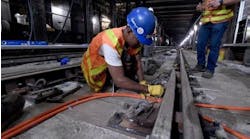Wisconsin Gov. Evers announces $25 million investment for transit services in Madison, Milwaukee
A $25-million investment for transit services in the city of Madison and Milwaukee County was announced by Wisconsin Gov. Tony Evers.
The investment is supported by the state's American Rescue Plan Act allocation, and includes more than $5.2 million for the city of Madison and more than $19.7 million for Milwaukee County.
The news comes as last week the governor announced $250 million for two new competitive grant programs to help communities across Wisconsin rebound and recover from the coronavirus pandemic with a $200 million Neighborhood Investment Fund, as well as a $50 million Healthcare Infrastructure Capital Investment grant program.
These programs will help neighborhoods recover from the pandemic and address the equity gap in the state—like housing projects, transit and childcare solutions and increasing access to healthcare in underserved communities.
“I often talk about connecting the dots, and that's what our vital transit systems do across our state, helping workers, families and students get from point A to point B safely,” said Gov. Evers. “For our most urban centers to be targeted by Republican cuts during the last budget was a slap in the face to the disproportionate number of Wisconsinites in those communities who depend on public transit to get to school, work, doctor's appointments—you name it. I am glad to be putting our ARPA funds to good use in these communities to help ensure our families, workers and businesses, and our economic drivers for the state continue to bounce back from the pandemic and see long-term economic recovery.”
The $25 million investment made by Gov. Evers will help fill a gap in funding left by the Legislature's Joint Committee on Finance during the state budget process when Republican legislators voted to cut public transit funding through the State Urban Mass Transit Operating Assistance Program in Milwaukee and Madison by 50 percent over the biennium.
Wisconsin Department of Transportation (WisDOT) Secretary-designee Craig Thompson praised Gov. Evers’ use of funds to support transit in Milwaukee and Madison.
“Like all of Wisconsin, Milwaukee and Madison rely on transit to provide the basic mobility that underpins our economy and quality of life,” Thompson said. “These systems took a hit during the pandemic, and I praise Gov. Evers’ decision to ensure that no part of our state is missing the funding that helps people get to work, visit family members or see a doctor.
“The number one barrier for job seekers is often transportation; making sure people have a way to get to work opens doors for workers and strengthens our communities. Healthy transit systems mean stronger neighborhoods, greater equity and more economic opportunities.”
The resources provided will help Milwaukee and Madison support continuing transit services to help Wisconsinites get to work, school and job training, medical appointments, and other activities, especially low-to-middle-income Wisconsinites, individuals with disabilities and communities of color who disproportionately depend on public transit.
“Thank you to Congress for passing the American Rescue Plan and thank you to Governor Evers for recognizing the importance of funding a key resource for Milwaukee County residents. Transportation is an important resource in any community, but especially in Milwaukee County where we believe every resident should have connections to job centers, grocery stores, medical offices and recreation,” said Milwaukee County Executive David Crowley. “This is an investment in equity for our county and the exact kind of actions we need to take if we want to see families, communities, and our economy succeed for years to come.”
“Thank you, Governor Evers, for recognizing that transit is an essential service all across our state, and especially here in Madison,” said Madison Mayor Satya Rhodes-Conway. “Restoring some of Madison’s transit aid, which was unfairly cut by the legislature, will directly benefit our economy by getting people to work, shopping, school and more. It will also allow us to continue our partnerships with surrounding communities, which bring better transportation options to our region.”
Mass Transit Staff Report
Stories under this byline were produced through a team effort by the editorial staff of Mass Transit.
To learn more about our team, click here.
If you have a story idea, let us know by emailing [email protected]. Please review our contributor guidelines found here.


